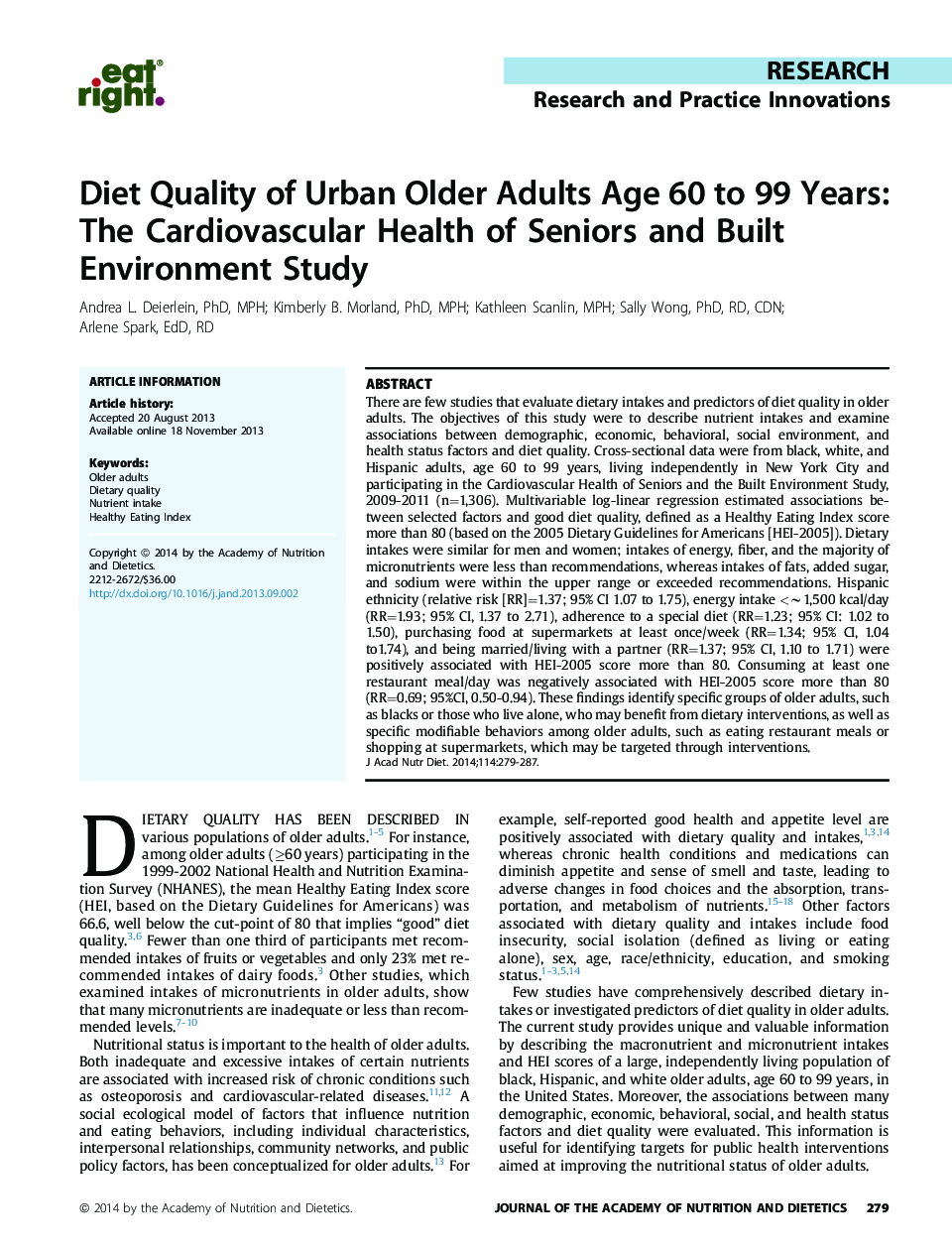| کد مقاله | کد نشریه | سال انتشار | مقاله انگلیسی | نسخه تمام متن |
|---|---|---|---|---|
| 5869694 | 1564069 | 2014 | 9 صفحه PDF | دانلود رایگان |
عنوان انگلیسی مقاله ISI
Diet Quality of Urban Older Adults Age 60 to 99 Years: The Cardiovascular Health of Seniors and Built Environment Study
ترجمه فارسی عنوان
کیفیت رژیم غذایی بزرگسالان سالمند شهری 60 تا 99 سال: سلامت قلب و عروق سالمندان و مطالعه محیط زیست
دانلود مقاله + سفارش ترجمه
دانلود مقاله ISI انگلیسی
رایگان برای ایرانیان
کلمات کلیدی
بزرگسالان سالمند، کیفیت غذا، مصرف غذا، شاخص غذا خوردن سالم،
موضوعات مرتبط
علوم زیستی و بیوفناوری
علوم کشاورزی و بیولوژیک
دانش تغذیه
چکیده انگلیسی
There are few studies that evaluate dietary intakes and predictors of diet quality in older adults. The objectives of this study were to describe nutrient intakes and examine associations between demographic, economic, behavioral, social environment, and health status factors and diet quality. Cross-sectional data were from black, white, and Hispanic adults, age 60 to 99 years, living independently in New York City and participating in the Cardiovascular Health of Seniors and the Built Environment Study, 2009-2011 (n=1,306). Multivariable log-linear regression estimated associations between selected factors and good diet quality, defined as a Healthy Eating Index score more than 80 (based on the 2005 Dietary Guidelines for Americans [HEI-2005]). Dietary intakes were similar for men and women; intakes of energy, fiber, and the majority of micronutrients were less than recommendations, whereas intakes of fats, added sugar, and sodium were within the upper range or exceeded recommendations. Hispanic ethnicity (relative risk [RR]=1.37; 95% CI 1.07 to 1.75), energy intake <â¼1,500 kcal/day (RR=1.93; 95% CI, 1.37 to 2.71), adherence to a special diet (RR=1.23; 95% CI: 1.02 to 1.50), purchasing food at supermarkets at least once/week (RR=1.34; 95% CI, 1.04 to1.74), and being married/living with a partner (RR=1.37; 95% CI, 1.10 to 1.71) were positively associated with HEI-2005 score more than 80. Consuming at least one restaurant meal/day was negatively associated with HEI-2005 score more than 80 (RR=0.69; 95%CI, 0.50-0.94). These findings identify specific groups of older adults, such as blacks or those who live alone, who may benefit from dietary interventions, as well as specific modifiable behaviors among older adults, such as eating restaurant meals or shopping at supermarkets, which may be targeted through interventions.
ناشر
Database: Elsevier - ScienceDirect (ساینس دایرکت)
Journal: Journal of the Academy of Nutrition and Dietetics - Volume 114, Issue 2, February 2014, Pages 279-287
Journal: Journal of the Academy of Nutrition and Dietetics - Volume 114, Issue 2, February 2014, Pages 279-287
نویسندگان
Andrea L. PhD, MPH, Kimberly B. PhD, MPH, Kathleen MPH, Sally PhD, RD, CDN, Arlene EdD, RD,
